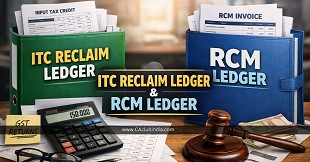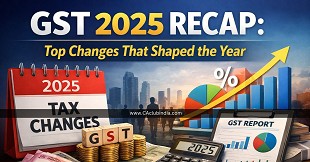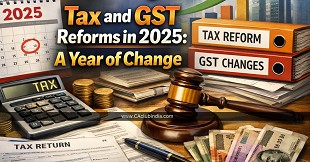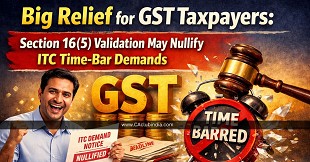GST Articles
Gold and Silver Taxation: Understanding the Shine
CA Umesh Sharma 06 January 2026 at 06:58Arjuna (Fictional Character): Krishna, gold and silver prices are rising day by day. Indian families traditionally invest in gold for security, weddings, and sa..
Building your office? Be prepared to lose the ITC
Raj JaggiUnderstand why GST input tax credit is blocked on office construction and interior works under Section 17(5)(d) of the CGST Act, even for business use, and how legislative intent, court rulings, and capitalisation rules shape ITC eligibility.
ITC Reclaim Ledger & RCM Ledger: What Professionals Must Watch Now
CA Amit Harkhani 03 January 2026 at 09:47GSTN's Dec 2025 advisory enforces strict ITC and RCM ledger validations. Excess ITC claims now trigger GSTR-3B blocks unless backed by ITC Reclaim and RCM ledger balances.
Applicability Of GST On Supplies Made To Special Economic Zones
Raj JaggiExplains GST treatment of supplies to SEZs, zero-rated supply under IGST Act, authorised operations, refunds, and post-01.10.2023 legal changes.
Ocean Freight Under GST In CIF Contracts: The Journey From Controversy To Clarity
Raj JaggiIGST on ocean freight under CIF imports stands conclusively settled after the Supreme Court’s Mohit Minerals ruling and Notification 13/2023, effective 1 Oct 2023. This article explains the litigation history, double taxation issue, refund implications, and why the relief applies only to ocean freight, not air freight.
GST 2025 Recap: Top Changes That Shaped the Year
Poojitha Raam VinayGST in 2025 marked a major shift with simplified returns, stricter ITC rules, AI-driven compliance and the rollout of GST 2.0 reforms.
25 Major Tax and GST Reforms in 2025: A Year of Change
CA Umesh Sharma 30 December 2025 at 06:52Discover the key tax and GST updates of 2025 explained through a conversation between Arjuna and Krishna. Learn how GST reforms, income tax changes, TDS/TCS updates, and compliance simplifications impact taxpayers and businesses. Stay informed to maximize benefits and avoid penalties.
India's 2025 GST Reforms & Mutual Fund Growth: What Businesses and Investors Must Know
Maruthi Dasari 29 December 2025 at 06:55GST 2.0 simplifies tax compliance in 2025 while mutual fund AUM crosses Rs 80 lakh crore. Key year-end GST, ITR and investment insights explained.
Unbilled Revenue Under GST: Why Tax Liability Arises Even Without An Invoice
Raj JaggiUnderstand how GST liability can arise even without invoice or payment. Learn time of supply rules, unbilled revenue treatment and key legal provisions.
Big Relief for GST Taxpayers: Section 16(5) Validation May Nullify ITC Time-Bar Demands
CA Varun GuptaSpecial procedure notified to rectify GST ITC demands raised solely due to Section 16(4) time limit, now validated under Sections 16(5) and 16(6). Explains legislative background, Delhi Notification 22/2024, eligibility, timelines, limitations, and no-refund caveat for FY 2017-18 to FY 2020-21 cases.
Popular Articles
- TDS Rate Chart For Tax Year 2026-27: With Revised Section Codes in Challans
- Revised Return Due Date Extension
- Interest Computation Changes under GST (Effective from January 2026)
- Tax Deduction Rules for Employee Contributions From April 2026
- TDS and TCS: The New Shields and Arrows of the Taxpayer
- Tax Calculation Slabs For FY 2025-26 (AY 26-27)
- Comprehensive Guide to Statutory, Tax & Regulatory Compliances for Hotels
- Section 144C Time-Limit Finally Clarified: No More Litigation on Draft vs Final Assessment Deadlines
Trending Online Classes
-
DT & Audit (Exam Oriented Fastrack Batch) - For May 26 Exams and onwards Full English
 CA Bhanwar Borana & CA Shubham Keswani
CA Bhanwar Borana & CA Shubham Keswani -
IDT LIVE Exam Oriented Batch | May 2026, Sept 2026 & Jan 2027
 CA Arpita Tulsyan
CA Arpita Tulsyan













 CAclubindia
CAclubindia
